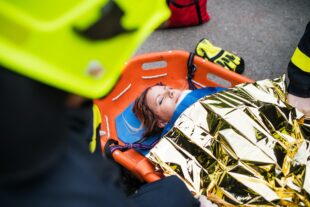Understanding and Coping with Trauma: The Impact of Car Accidents
Christian Counselor Spokane
Car accidents are unfortunate events that can have profound and lasting effects on individuals, both physically and psychologically. Beyond the immediate physical injuries, the emotional aftermath of a car accident can result in trauma, a complex and often misunderstood phenomenon. Coping with trauma can be a challenge.
This essay aims to explore the nature of trauma stemming from car accidents, examining its psychological impact, common symptoms, and coping mechanisms. Additionally, we will delve into the role of support systems and professional help in the process of healing.
Understanding trauma
 Trauma is not solely confined to physical injuries; it encompasses emotional and psychological distress that arises from experiencing or witnessing a life-threatening or distressing event. Car accidents, being sudden and often violent, have the potential to instigate trauma due to the immediate threat to one’s life and well-being.
Trauma is not solely confined to physical injuries; it encompasses emotional and psychological distress that arises from experiencing or witnessing a life-threatening or distressing event. Car accidents, being sudden and often violent, have the potential to instigate trauma due to the immediate threat to one’s life and well-being.Trauma from a car accident can manifest in various forms and intensities, depending on factors such as the severity of the accident, previous experiences, and the individual’s coping mechanisms.
Coping with trauma: the psychological impact
The psychological impact of a car accident can be far-reaching, extending well beyond the physical injuries. One common psychological response to a traumatic car accident is the development of post-traumatic stress disorder (PTSD).
Individuals with PTSD may experience intrusive memories, flashbacks, nightmares, and heightened anxiety related to the accident. Additionally, they may become hypervigilant, avoiding situations or stimuli reminiscent of the traumatic event, which can significantly impact their daily lives.
Another psychological consequence of car accidents is the development of phobias or anxieties related to driving or being in a vehicle. Even individuals who were not driving at the time of the accident may develop a profound fear of getting into a car, experiencing panic attacks or extreme anxiety when faced with the prospect of driving or riding as a passenger.
Common symptoms of trauma after a car accident
Flashbacks and intrusive memories
Individuals may re-experience the traumatic event through distressing and involuntary memories, often triggered by stimuli reminiscent of the accident.
Avoidance behaviors
A person may go to great lengths to avoid situations, places, or activities associated with the car accident, leading to a significant disruption in their daily life.
Hyperarousal
Hyperarousal involves an exaggerated startle response, difficulty concentrating, irritability, and heightened anxiety, making it challenging for individuals to relax or focus on tasks.
Emotional numbness
Trauma can lead to emotional detachment, where individuals may feel numb or disconnected from their emotions as a way of self-protection.
Sleep disturbances
Nightmares, insomnia, and restless sleep are common manifestations of trauma, affecting an individual’s overall well-being and exacerbating other symptoms.
Mechanisms for coping with trauma
Coping with trauma after a car accident is a complex and individualized process. Various coping mechanisms may be employed, and their effectiveness can vary from person to person. Some common coping strategies include:
Seeking support
Talking about the experience with friends, family, or support groups can provide a sense of validation and understanding. Sharing emotions and thoughts can be a crucial step in the healing process.
Professional counseling
Seeking the guidance of a mental health professional, such as a therapist or counselor, can offer structured support and coping strategies tailored to the individual’s specific needs.
Self-care practices
Engaging in self-care activities, such as exercise, mindfulness, and relaxation techniques, can contribute to overall well-being and help alleviate symptoms of trauma.
Gradual exposure
Gradual exposure to triggers, under the guidance of a mental health professional, can help individuals confront and overcome their fears, reducing avoidance behaviors.
Medication
In some cases, psychiatric medications may be prescribed to alleviate symptoms of anxiety, depression, or sleep disturbances associated with trauma.
Role of support systems
Support systems play a pivotal role in an individual’s recovery from trauma after a car accident. Friends and family members can provide emotional support, understanding, and encouragement throughout the healing process. Creating an open and non-judgmental space for the individual to express their feelings can foster a sense of safety and connection.
Moreover, loved ones can actively participate in the individual’s recovery by encouraging them to seek professional help, accompanying them to therapy sessions, and assisting with practical matters, such as transportation or daily tasks that may be challenging during the recovery period.
Professional help and intervention
 When coping mechanisms and support systems are insufficient, or when symptoms persist and significantly impact daily functioning, seeking professional help becomes imperative. Mental health professionals, including psychologists, psychiatrists, and trauma specialists, are trained to assess and treat trauma-related disorders effectively.
When coping mechanisms and support systems are insufficient, or when symptoms persist and significantly impact daily functioning, seeking professional help becomes imperative. Mental health professionals, including psychologists, psychiatrists, and trauma specialists, are trained to assess and treat trauma-related disorders effectively.
Therapeutic interventions, such as cognitive-behavioral therapy (CBT) and eye movement desensitization and reprocessing (EMDR), have shown efficacy in treating trauma stemming from car accidents. These approaches aim to help individuals process and reframe traumatic memories, manage symptoms, and develop healthier coping mechanisms.
Conclusion
Trauma resulting from a car accident is a complex and multifaceted experience that can have profound effects on an individual’s mental and emotional well-being. Understanding the psychological impact, recognizing common symptoms, and exploring effective coping mechanisms are crucial steps in addressing and mitigating the long-term consequences of trauma.
While the road to recovery may be challenging, the support of friends, family, and mental health professionals in Spokane can make a significant difference. By fostering a compassionate and understanding environment, society can contribute to breaking the stigma surrounding mental health and encourage individuals to seek the help they need to heal from the trauma of a car accident.
Ultimately, acknowledging and addressing the psychological impact of car accidents is a vital aspect of comprehensive healthcare that promotes holistic well-being.
“Car Fire”, Courtesy of Gwendal Bar, Unsplash.com, CC0 License;”Blurred Vision”, Courtesy of Ehimetalor Akhere Unuabona, Unsplash.com, CC0 License; “Car Wreck”, Courtesy of Michael Jin, Unsplash.com, CC0 License; “Accident Victim”, Courtesy of Getty Images, Unsplash.com, Unsplash+ License







